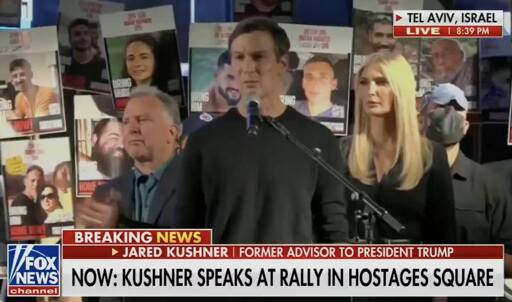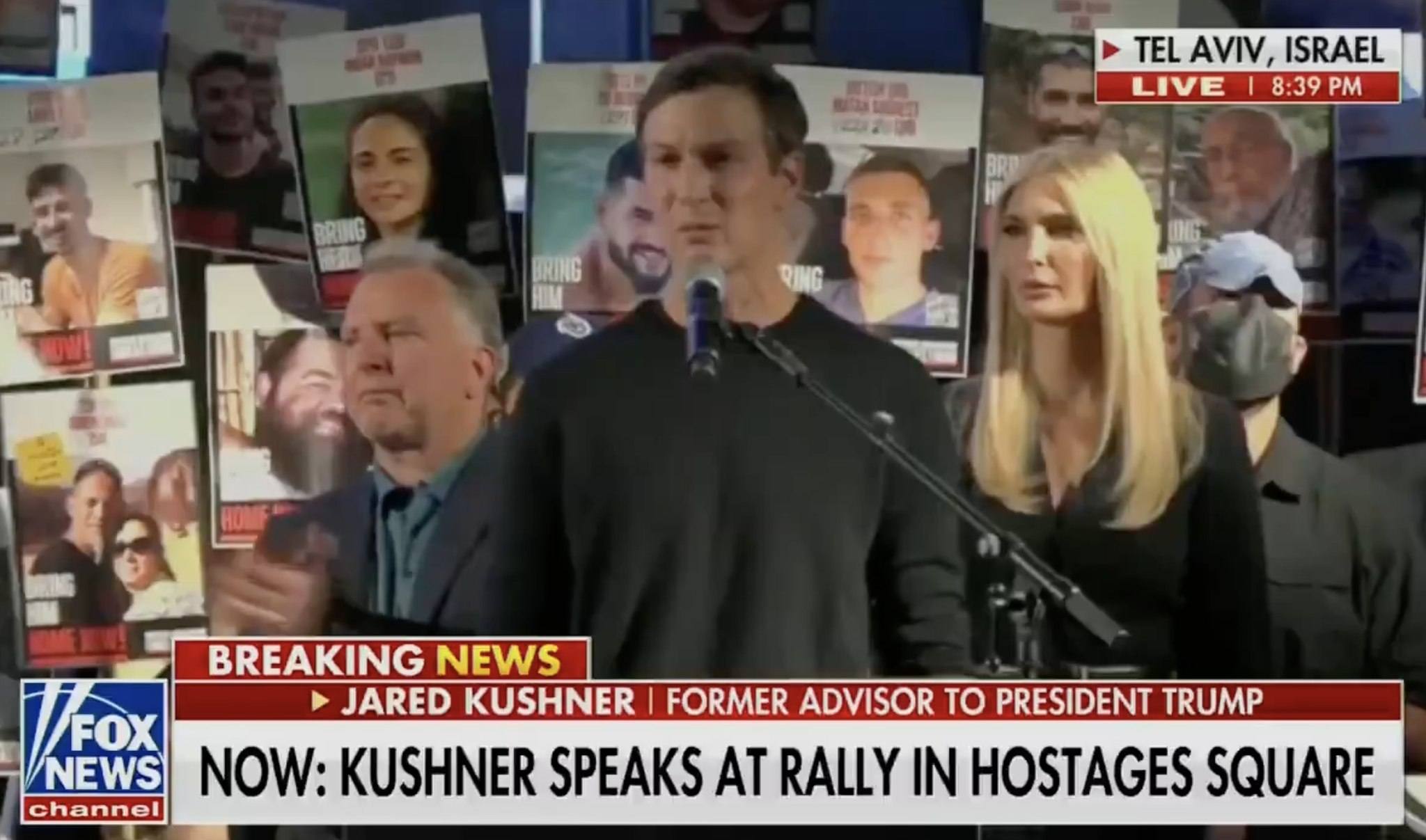“The Sleep of Reason Produces Monsters”—the caption of Goya’s 1799 etching—was a warning against moral blindness, against reason stripped of empathy. It may not apply neatly to Jared Kushner, Donald Trump’s son-in-law, but his rise has had the same somnambulant quality: less a climb than an inheritance.
Installed in the White House by marriage rather than merit, he became his father-in-law’s most indulged adviser—a diplomatic novice handed the Middle East peace portfolio because family outranked expertise. Between 2017 and 2021, this young and slightly mysterious man who once said he relaxed by looking at buildings oversaw the administration’s “peace plan,” culminating in the highly transactional Abraham Accords—deals that normalised Israel’s ties with Gulf monarchies while leaving the Palestinians conspicuously outside the frame. Jordan, as I wrote at the time, kept its caution.
When the first Trump years ended, Kushner did what many former officials only dream of—he turned his address book into a balance sheet. In 2021 he founded Affinity Partners, a private-equity firm based in sun-slapped Miami. Within six months he had secured $2 billion from Saudi Arabia’s Public Investment Fund, chaired by Crown Prince Mohammed bin Salman, whose personal approval overrode internal misgivings. Reuters later reported additional Gulf-state backing, the Senate Finance Committee since noting that Affinity has collected roughly $157 million in management fees—a tasty afterglow of office that would trouble almost anyone but the man himself.
Since leaving Washington, Kushner and Ivanka Trump, who converted to Judaism in 2009, have kept a calculated distance from Donald Trump—part image management, part tactical retreat. The separation read as both self-preservation and positioning: close enough to profit from future influence, far enough to escape the chaos that once defined it. It is an image carefully sculpted, not slapped on like wet clay.
By 2024, as Gaza burned, Kushner re-emerged. “Gaza’s very valuable waterfront property,” he said—a phrase that landed like a Freudian slip, reducing catastrophe to real estate. He offered advice on Gaza’s reconstruction even as he pursued mega-deals such as the $55 billion Electronic Arts “take-private”—much to the chagrin of EA gameplayers—with the same Saudi fund that seeded his firm. In October 2025, amid a fragile cease-fire, the Associated Press credited Trump-era envoys—including Kushner—with quiet, back-channel involvement.
Photos of Affinity’s Miami offices show a family office disguised as a global fund: muted décor, small staff, white walls, and the steady hum of expensive air-conditioning. Tom Wolfe would have had a field day. Visitors describe Kushner pacing barefoot during long calls, gesturing with his phone. Meetings, people suggest, often end in polite vagueness rather than decision. The manner is frictionless—calm, confident, faintly antiseptic. Former colleagues recall the same vibe in Washington: rarely angered, never hurried, convinced that numbers could soothe politics. Even so, Kushner’s struggle to secure a permanent top-level security clearance was widely cited in Washington as a red flag.
He also surfaced in the Mueller investigation, his meetings with Russian and other foreign figures serving as a case study in the perils of mixing business, diplomacy, and family inheritance. To admirers, he is unflappable and visionary; to others, a kind of avatar of polite ambition. In Gulf business circles, he is said to speak the language of return multiples and megaprojects—a dialect, I’m assured, native to sovereign-fund culture.
It’s easy enough to picture how a man in Kushner’s position might profit from peace. Hypothetically—emphasis on the word—he could collect management fees on MENA funds for postwar reconstruction; take equity in Gaza–Israel infrastructure once the dust settles; invest in “coastal regeneration,” energy, logistics, or tech ventures that depend on a cease-fire to function. None of this is necessarily illicit. It simply shows how private equity transforms diplomacy into deal flow—how peace becomes another line item in a prospectus. As Hannah Arendt warned, “The most radical revolutionary will become a conservative the day after the revolution.”
Palestinian officials have long rejected this logic. In 2019 they boycotted Kushner’s Bahrain conference, calling its promises of investment a bribe for silence. More recently, critics have said you cannot build a riviera on the bones of the dead. The discomfort is universal: profit may rebuild what bombs destroyed, but it also risks sanitising the destruction.
To allies, Kushner remains a believer in capital as cure—a man determined to prove that investment can succeed where diplomacy failed. To critics, that is the delusion of his career: the faith that liquidity can redeem dispossession. The moral deficit, not the financial one, haunts every discussion of Gaza’s reconstruction. Sympathy never appears on a spreadsheet.
Between Miami (where fellow billionaire Steve Witkoff is a neighbour), Riyadh, and Tel Aviv, Kushner moves easily, fluent in that grammar of patient capital. In Washington, investigators and former colleagues see something plainer: not vision but access monetised—and a family’s privilege refashioned as a global business model.
“There is no document of civilisation which is not at the same time a document of barbarism,” Walter Benjamin once wrote. In the end, Kushner’s story isn’t just about one man’s knack for turning proximity into capital; it’s about a political culture that treats proximity itself as capital. His calm, his polish, his euphemisms for ruin—all belong to an era in which the line between service and self-interest has blurred into consultancy. The mirage in the desert is not really there. What unsettles people is not simply that he might profit from Gaza’s resurrection, but that such a prospect no longer shocks anyone at all.
He said recently, without irony, “Instead of replicating the barbarism of the enemy, you chose to be exceptional—you chose to stand for the values that you stand for, and I couldn’t be prouder to be a friend of Israel.”
Not long after, a Palestinian aid worker told the BBC, “We can no longer recognise ourselves as human beings.”
And now Kushner is hailed by some as the new Kissinger, presumably forgetting that Kissinger was labelled a “war criminal” by so many people due to his involvement in controversial foreign policies that led to significant human suffering, such as the Vietnam War and actions in Latin America.
The Goya etching is from Los Caprichos, a series of 80 satirical prints exposing the social and political follies of late-18th-century Spain. It depicts a man—often read as Goya himself—slumped asleep at his desk as owls and bats swarm behind him. It was on this desk that the artist engraved the warning: “The sleep of reason produces monsters.” In his notes, Goya clarified this: “Imagination abandoned by reason produces impossible monsters; united with her, she is the mother of the arts and the source of their wonders.”
The post The Price of Peace appeared first on CounterPunch.org.
From CounterPunch.org via this RSS feed






